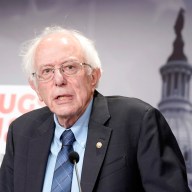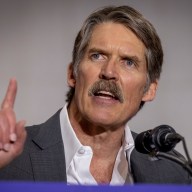WASHINGTON – President Barack Obama said Wednesday progress has been made in rebuilding the U.S. economy but more remains to be done.
Obama made his remarks at a prime-time news conference that capped his 100th day in office, a time of national testing given a deep economic recession and unprecedented credit crunch.
Obama said: “And all of this means you can expect an unrelenting, unyielding effort from this administration to strengthen our prosperity and our security – in the second hundred days and the third hundred days and all the days after.”
At his news conference, Obama also said he had no second thoughts about having approved the release of memos from the administration of former president George W. Bush detailing the use of waterboarding and other harsh interrogation techniques used on terrorist suspects.
“I do believe that it is torture,” he said flatly of waterboarding, which simulates drowning.
He appeared to acknowledge useful information had been obtained in interrogations in which it was used, an assessment made in a memo by his administration’s top intelligence official.
The president said it was not possible to know whether the same information could have been obtained if waterboarding had not been employed.
“I’m absolutely convinced we are not taking shortcuts that undermine who we are,” said Obama, who has come under criticism from numerous Republicans for his decision to release the memos.
The prime-time news conference was the third of Obama’s presidency, and the first that was not dominated by the economy – in part because of concerns about a swine flu epidemic still spreading in the United States.
Asked about Chrysler, he was notably more upbeat that an administration report issued nearly a month ago.
“I’m feeling more optimistic,” he said.
Obama did not say so but Italian automaker Fiat Group SpA is expected to sign a partnership agreement with Chrysler LLC by Thursday as part of negotiations to keep the struggling U.S. automaker alive without bankrupcty protection.
The administration has given General Motors Corp. an additional month to present a restructuring plan that meets his administraiton’s approval.
“They’re still in the process of presenting us with another plan,” he said.
He added: “I would love to get the U.S. government out of the auto business as soon as possible.”
On a political matter, Obama said he thought Pennsylvania Senator Arlen Specter’s switch Tuesday from Republican to Democrat would “liberate him to co-operate on critical issues like health care, like infrastructure and job-creation, areas where his inclinations were to work with us but he was feeling pressure not to.”
Obama’s intensive schedule for the day demonstrated the degree to which the administration saw both possibility and peril in the 100-day marker – traditionally a symbolic milestone for a president.
Presidential aides have derided it as a media-created holiday in which the White House participates reluctantly. They also recognize it is a time frame by which all modern presidents are judged, at least initially, and which can produce negative narratives that stick with administrations for years.
So, the White House has jumped into the celebration, making high-level Obama advisers available anywhere they were needed over the last week and crafting the president’s day to maximum advantage.
The opening act of the Obama presidency has been head-turning, not only for the dire times in which he took office but his flurry of activity.
Determined to revive the dismal economy, his signature challenge, Obama has overseen a trillion-dollar infusion of federal spending and major interventions by Washington into the private sector, from directing executive pay to seizing huge governmental ownership shares in financial institutions and possibly General Motors.
Looking forward, Obama struck a cautious note, warning that “more will be lost” in a recession that already has cost millions of Americans their homes and jobs.
Obama also has put the United States on track to end the Iraq war, while escalating the one in Afghanistan.
In fact, nearly every day since Obama’s Jan. 20 inauguration has brought a sweeping new promise to upend business as usual, veering from big issues to small and back.
The reward: strong public backing despite a still-staggering economy. An Associated Press-GfK poll shows 48 per cent of Americans believe the United States is headed in the right direction, the first time in years more people than not expressed optimism for a brighter future.
But most of what Obama has done so far, as would be expected for little more than three months, amounts to no more than a down payment.
Obama stressed this during a speech and short question-and-answer session earlier Wednesday in a St. Louis, Mo, suburb.
“Our progress has to be measured in the results that we achieve over many months and years, not the minute-by-minute talk in the media,” he told a friendly crowd at a high school.
“I’m not a miracle worker.”
For instance, he has begun redefining the U.S. image around the globe, a combination of his fresh look and diplomatic outreach. But those efforts will take time to bear fruit in places like Iran, North Korea, Russia, Cuba and Sudan.
Obama also said he will close the controversial U.S. detention facility at Guantanamo Bay, Cuba, but he has yet to confront the tough decisions about where to send terror suspects held there.
Most notably, Obama insisted the massive but short-term economic stimulus that has increased the federal deficit would be unwise without a commitment to cutting spending and a long-term reshaping of the U.S. economy.
So he has proposed an all-at-once agenda that includes increased education spending to produce a better-trained work force, greater support for renewable energy development, a high-priced system for companies to buy and sell rights to emit dangerous pollutants, a vast expansion of health insurance and new rules to rein in the riskiest Wall Street behaviour. He has asked Congress to provide it all by the end of the year.
Democrats in Congress gave Obama a 100-day present by advancing a $3.4-trillion federal budget for next year. The non-binding budget blueprint amounted to a first step in Obama’s goal of providing health care coverage for all Americans, because it gives Democrats the option of stopping any Republican delaying tactics on the president’s health care plan.
















